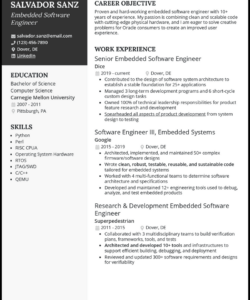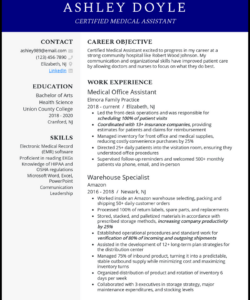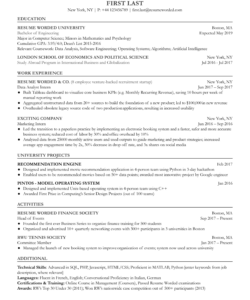Stepping out of college as a freshly minted mechanical engineering graduate is an exciting time, filled with potential and new opportunities. However, the job market can feel daunting, especially when you’re just starting and don’t have years of industry experience to lean on. Your resume becomes your first and often only chance to make a lasting impression on potential employers, telling your story and showcasing your capabilities even before you get to an interview.
That’s where a well-structured and thoughtfully presented resume comes into play. It’s not just about listing your qualifications; it’s about strategically highlighting your academic achievements, projects, and skills in a way that resonates with hiring managers. This article will guide you through creating an effective mechanical engineering fresher resume template, ensuring you stand out from the crowd and land those coveted entry-level positions.
Crafting Your First Impression: Essential Sections for Your Resume
Your resume is more than just a document; it’s your personal marketing tool designed to open doors. For a mechanical engineering fresher, who might lack extensive professional experience, every section becomes crucial. It’s about showcasing your potential, your foundational knowledge, and your eagerness to learn and contribute to a team.
Start with a clean and professional header. This should prominently feature your full name, phone number, professional email address, and a link to your LinkedIn profile. Ensure your email address sounds professional (e.g., [email protected]) and that your LinkedIn profile is complete and consistent with your resume information.
Following your contact information, a compelling objective or summary statement is vital. For freshers, an objective statement is often more appropriate. This brief paragraph should clearly state your career goals and what you aim to contribute to the company. Tailor this statement for each application, aligning it with the specific job description and the company’s mission. For instance, you could express your ambition to apply your solid mechanics knowledge to innovative product design.
Education Section: Your Foundation
This is arguably the most important section for a mechanical engineering fresher. Clearly list your university, degree (e.g., Bachelor of Science in Mechanical Engineering), your major, and your graduation date or expected graduation date. If your GPA is strong (typically 3.0 or higher on a 4.0 scale), include it. More importantly, highlight relevant coursework that directly relates to the job you’re applying for. This shows employers you have the theoretical background for the role.
- Relevant Coursework: Include classes like Thermodynamics, Fluid Mechanics, Machine Design, Materials Science, CAD/CAM, Vibrations, etc.
- Academic Projects: List significant academic projects, especially your capstone or senior design project.
- Academic Achievements: Dean’s List, scholarships, or honor society memberships.
The projects section is your opportunity to demonstrate practical application of your skills. Since you might not have work experience, your academic projects, personal projects, or club activities become your “experience.” For each project, briefly describe the problem you addressed, your role, the methodologies and tools you used (e.g., SolidWorks, ANSYS, MATLAB), and the quantifiable results or impact. Did you design a new mechanism? Did you optimize a process? Be specific and use action verbs.
Next, dedicate a section to your skills. Divide this into “Technical Skills” and “Soft Skills.” Technical skills are critical for mechanical engineers; include specific software proficiency (CAD software like AutoCAD, SolidWorks, CATIA; simulation tools like ANSYS, Abaqus; programming languages like Python, MATLAB; manufacturing processes knowledge). For soft skills, think about teamwork, problem-solving, communication, adaptability, and critical thinking. These are highly valued in any engineering role.
If you have any internships, part-time jobs, or volunteer experiences, list them under “Work Experience” or “Relevant Experience.” Even if the job wasn’t directly in mechanical engineering, emphasize transferable skills like problem-solving, attention to detail, teamwork, or technical abilities you might have used. Finally, any awards, honors, certifications, or extracurricular activities (especially leadership roles in engineering clubs) can add significant value, demonstrating your initiative and well-roundedness.
Making Your Mechanical Engineering Fresher Resume Template Stand Out
Beyond the content itself, the presentation of your resume plays a massive role in whether it gets noticed. A clean, uncluttered design, consistent formatting, and strategic use of white space make your resume easy to read and professional. Remember, recruiters spend only a few seconds scanning each resume initially, so clarity is paramount.
One of the most crucial aspects for a modern resume is keyword optimization. Many companies use Applicant Tracking Systems (ATS) to filter resumes based on keywords before a human even sees them. Carefully read the job description and identify key skills, software, and qualifications mentioned. Integrate these keywords naturally into your resume, especially in your skills section, project descriptions, and summary statement. For example, if a job description mentions “FEA analysis,” make sure that phrase appears in your resume if it’s a skill you possess.
Always quantify your achievements whenever possible, even for academic projects. Instead of saying “Designed a part,” try “Designed a fixture that reduced assembly time by 15%.” This shows the impact of your work and provides concrete evidence of your capabilities. Numbers speak volumes and demonstrate a results-oriented mindset.
Proofreading is non-negotiable. A single typo or grammatical error can make your resume look unprofessional and careless. Read it aloud, use spell-checkers, and, ideally, have a friend, mentor, or career advisor review it. A fresh pair of eyes can spot mistakes you might have overlooked.
- Tailor Your Resume: Always customize your mechanical engineering fresher resume template for each job application to match the specific requirements of the role.
- Use Action Verbs: Start bullet points with strong action verbs (e.g., Designed, Developed, Analyzed, Implemented, Optimized).
- Keep it Concise: For freshers, a one-page resume is generally preferred. Be concise and focus on the most relevant information.
- Save as PDF: Always submit your resume as a PDF file to maintain formatting consistency across different systems.
While your resume is the core document, a well-crafted cover letter can significantly enhance your application. Use the cover letter to elaborate on why you’re interested in the specific company and role, how your skills align, and what unique value you can bring. It’s your chance to add personality and context that the resume alone cannot convey.
Remember that securing your first role in mechanical engineering is a journey. Your resume is a powerful tool, but it’s part of a larger strategy that includes networking, building your online professional presence, and continuous learning. Keep refining your skills and updating your resume as you gain more experience and knowledge.


